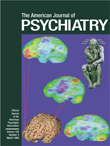Dr. Kenny and Colleagues Reply
To the Editor: We have read with interest the letter of Dr. Chabrol and colleagues commenting on our recent documentation of cognitive impairment in adolescents with schizophrenia.
Clearly, it is important to clarify an issue that might confound a neuropsychological finding.
We disagree with the suggestion of Dr. Chabrol and colleagues that the statistically significant cognitive deficits in our group of adolescent patients are caused by medication side effects. First, we need to repeat that all of the patients in our study were stabilized on regimens of antipsychotic medications, a method that is commonly employed in studies of adult schizophrenic patients. We can add that there had been no recent changes in the medication regimen for the patients before cognitive testing.
Second, we are not aware of any study of effects of antipsychotic medication on cognition during adolescence. However, the literature on adults is large, highly relevant, and on balance, contradicts the suppositions of Chabrol and colleagues. Specifically, literature reviews of this topic make the following points:
1. Chronic administration of neuroleptic drugs does not generally impair neuropsychological functioning (1, 2).
2. Medication effects, if present, are transient and occur at the initiation of treatment (1).
3. Rather than worsen performance, chronic administration of neuroleptics improves performance on some tasks requiring sustained attention and visuomotor problem-solving skill (1).
For a review of earlier studies of structural neuroimaging and neuropsychological performance in adolescent patients with schizophrenia, see our 1995 article (3).
Finally, as clinical neuroscientists, we are much more focused on the empirical, factual basis of our assertion than on whether it evokes pessimism or optimism. As you know, this is the first controlled study of detailed neuropsychological function in teenagers with schizophrenia. We hope further studies will be performed to elucidate the full nature of these measures.
1. Cassens G, Inglis AK, Appelbaum PS, Gutheil TG: Neuroleptics: effects on neuropsychological function in chronic schizophrenic patients. Schizophr Bull 1990; 16:477–499Crossref, Medline, Google Scholar
2. Goldberg TE, Gold JM: Neurocognitive functioning in patients with schizophrenia: an overview, in Psychopharmacology—Fourth Generation of Progress. Edited by Bloom FE, Kupfer DJ. New York, Raven Press, 1995, pp 1245–1257Google Scholar
3. Findling RL, Friedman L, Kenny J, Swales TP, Cola D, Schulz SC: Adolescent schizophrenia: methodologic review of the current neuroimaging and neuropsychologic literature. J Autism Dev Disord 1995; 25:627–639Crossref, Medline, Google Scholar



